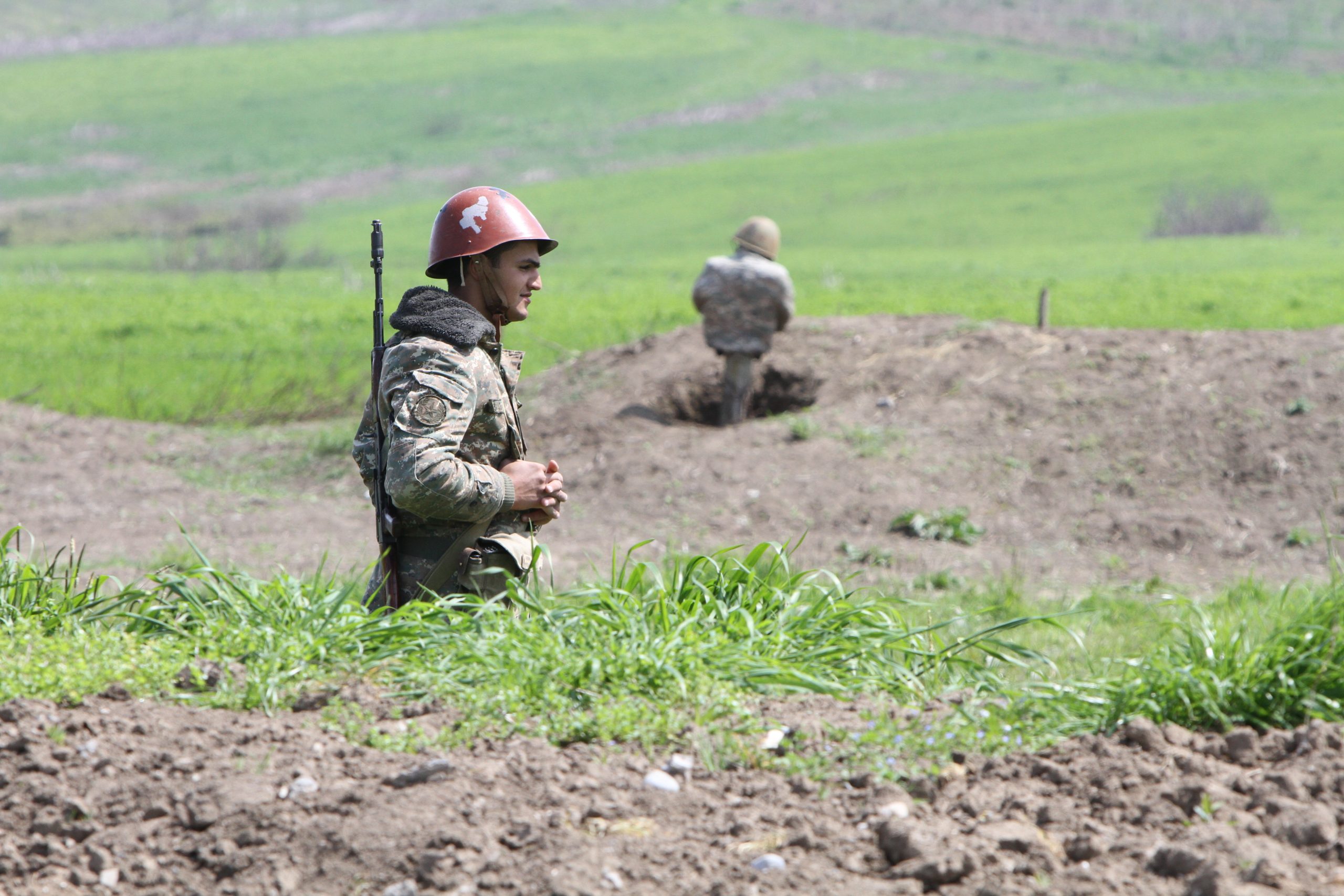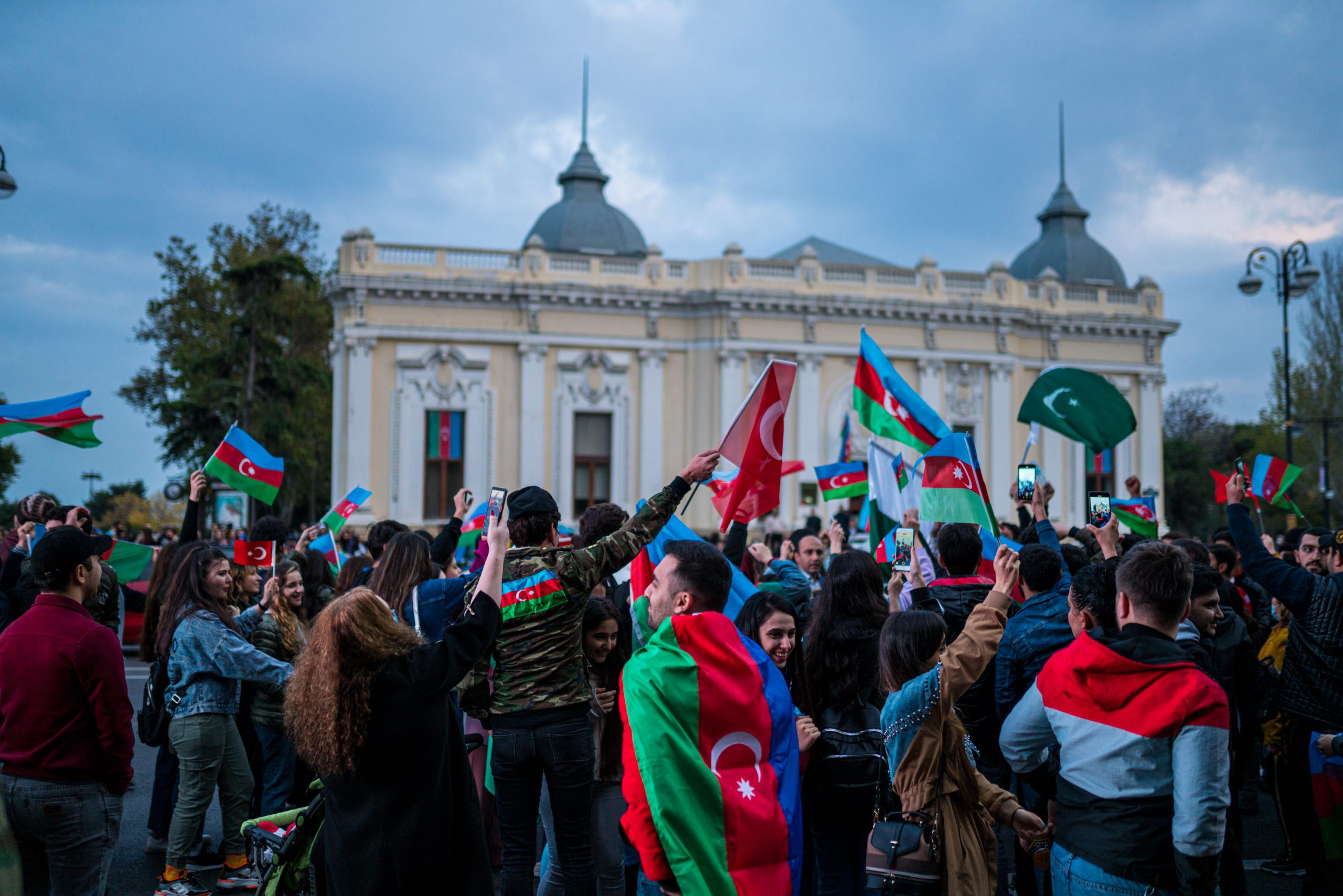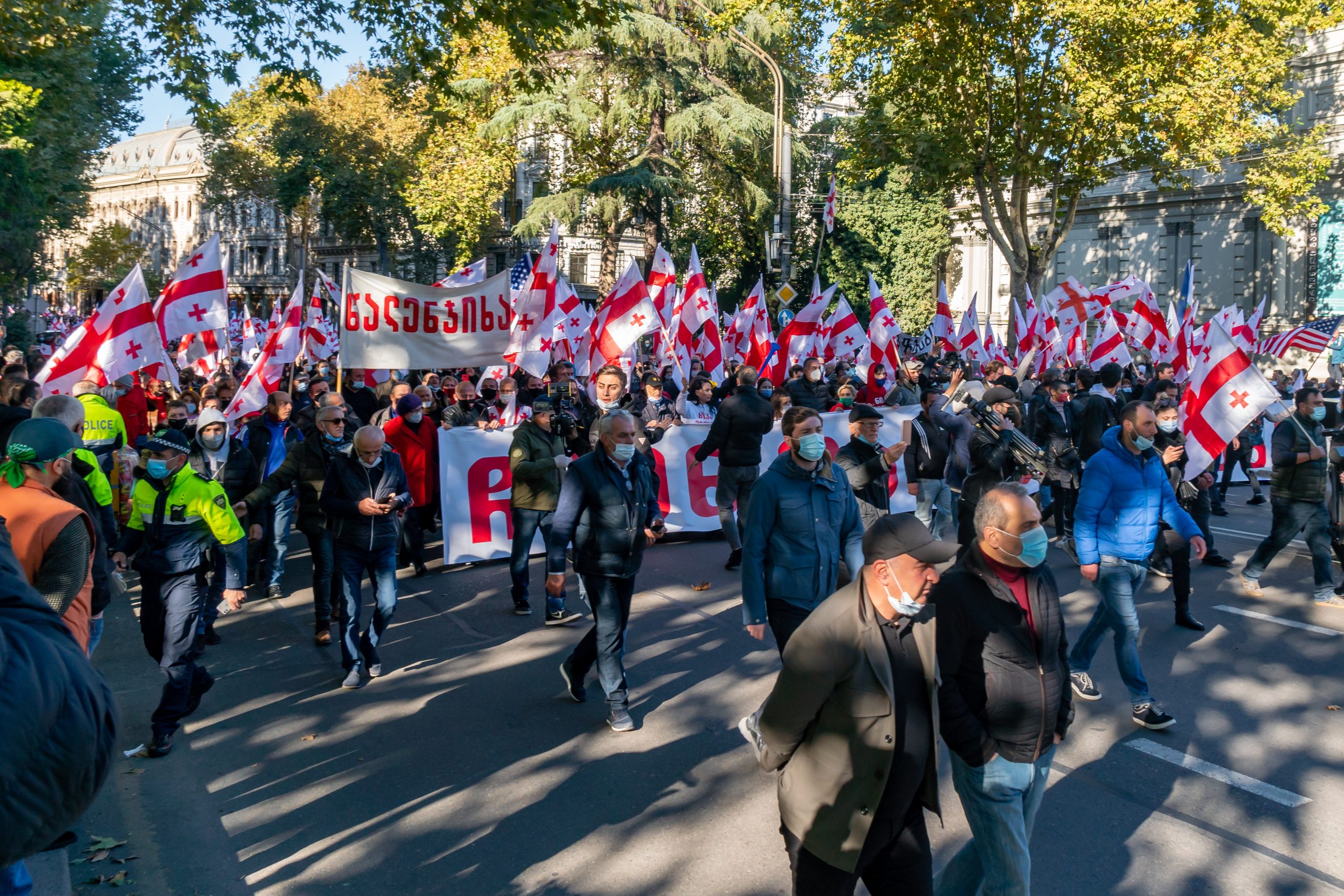Strategic Analysis Caucasus Brief
Bi-weekly review (2.-15.11. 2020)
Tomáš Baranec
The Nagorno Karabakh War

Karabakh frontline. Photo: Albert Khachatryan/ Shutterstock.com
The second war in Nagorno Karabakh ends with Russian-mediated agreement
Armenian Prime Minister Nikol Pashinyan had announced in the early hours of October 10, the signature of a „painful“ Russia-mediated agreement with Azerbaijan to end the war over the disputed Nagorno Karabakh.
Under the agreement, Armenian forces will have to relinquish all regions outside the territory of the former Nagorno Karabakh Autonomous Region (NKAO), which they have controlled since 1994. Although the Armenian side took these territories as a buffer zone and was willing to return them under certain conditions, provisions of the deal signed under the onslaught of the Azerbaijani army will be more painful for Yerevan than a possible deal which might be mediated under the auspices of the OSCE.
Among other things, the areas of the former NKAO, which have been conquered by the Azerbaijani army in recent weeks, including the city of Shusha (arm. Shushi), should also come under the direct control of Baku.
In parallel with the departure of the Armenian forces, the troops of the Russian Federation should be deployed on the line of contact in the role of peacekeepers. The contingent shall operate in the area for a period of five years with automatic renewal of the mandate unless either party notifies about its intention to terminate this clause six months before the expiration of the current term.
According to the agreement, the area outside Azerbaijan’s control will be connected to Armenia via the Lachin Corridor, protected by the Russian troops. In return, Armenia will allow the construction of a corridor between Azerbaijan and its exclave Nakhchivan, with the Russian FSB border guard guarding the road. However, the agreement does not specify the nature of this corridor. Even more importantly, the treaty does not yet mention the future status of Nagorno Karabakh.
Sources:
- Civilnet.am, “’I have signed a statement with Russia, Azerbaijan‘, Pashinyan“ https://www.civilnet.am/news/2020/11/10/I-have-signed-a-statement-with-Russia-Azerbaijan-Pashinyan/407067
- RBK, „Соглашение по Карабаху. Что получают и теряют стороны, (The Karabakh Agreement, What parties get and what they loose)“, https://www.rbc.ru/politics/10/11/2020/5faa0bfb9a79472d1159c5e8
Armenia

Anti-government protests, Yerevan. Photo: Cornelius Brandt/Shutterstock.com
Armenian opposition calls Pashinyan to step down
The signing of the cease-fire agreement has sent a shock wave across Armenian society not only at home but also in the vast diaspora. It has resulted in mass anti-government demonstrations and detainment of several opposition leaders.
„Dear Compatriots, sisters and brothers. I have made a very, very difficult decision for myself and for all of us. I have signed a statement with Presidents of Russia and Azerbaijan on ending the Karabakh war at 01:00 am. The text of the statement that has already been published is unspeakably painful for me personally and for our people. I made that decision as a result of an in-depth analysis of the military situation and the assessment of the people who know the situation the best. Also based on a belief that this is the best possible solution to the current situation. I will give a detailed message about all this in the coming days,“ said Armenian PM Nikol Pashinyan to the public while announcing the Russia-mediated agreement.
However, opposition forces describe the agreement as capitulation and blame the prime minister for it. The unfavourable development of the situation at the frontline has mobilized the Armenian opposition already on Monday. Following the fall of the strategically important city of Shusha (arm.: Shushi), 17 opposition parties, including those involved in governing the country in recent decades, have called for Pashinyan to resign.
Even the Armenian President Armen Sarkissian has announced that he only learned about the agreement from the media. Chaos erupted in the country, with an enraged mob breaking into the parliament and government office buildings at night. The Speaker of the Parliament, Ararat Mirzoyan, had to be hospitalized after the protesters pulled him out of the car and beat him.
Another mass anti-government rally of approximately 2000, organized on November 11 in front of Yerevan’s opera house, was abruptly put to an end by the security forces. Officers forced their way through the throng and roughly dragged away several of the organizers as the crowd chanted „Nikol – traitor!“.
During the demonstration, Eduard Sharmazanov of the Republican Party; Garnik Isagulyan, head of the National Security party; and Ruben Melikyan, the former human rights ombudsman of Nagorno Karabakh and now head of a legal-aid NGO in Armenia have been all detained. „Separately, other prominent figures were reportedly taken in for questioning to the National Security Service, including the leader of Prosperous Armenia, Gagik Tsarukyan; former president Serzh Sargsyan; and the NSS’s own former head, Artur Vanetsyan,” writes Joshua Kucera for Eurasianet.
Meanwhile, the prime minister also reminded the opposition of their share on the defeat. „We must prepare for revenge. We have not dealt properly with the corrupt, oligarchic scoundrels, those who robbed this country, stole soldiers‘ food, stole soldiers‘ weapons,“ said Pashinyan in the wake of mass protests.
De facto president of Nagorno Karabakh Arayik Harutyunyan described the dire situation in which Armenian forces were at the front. According to him, the fighting moved less than two kilometres from the de facto capital of Nagorno Karabakh, Stepanakert, and if the agreement was not signed quickly, the Armenians would „lose all Arcach (arm. Nagorno Karabakh).“ Harutyunyan added that although Armenian forces had managed to defend themselves against the Azerbaijani drones for some time, UAV’s had again caused them enormous losses in the last days of the war.
Russian Foreign Minister Sergey Lavrov as well has accused the Armenian opposition of speculations regarding the agreement on November 12. „There should not have been any illusions that the seven regions around Nagorno Karabakh could forever remain in the position they were one, one and a half, or two months ago,“ said Lavrov. He then stressed that „the unblocking of all communications – transport, economic – should play a hugely positive role in the revival of this region, including for the recovery of the Armenian economy, which suffered more than others due to the termination of trade and transport links with Azerbaijan and Turkey“.
Sources:
- KUCERA Joshua, Eurasianet.org, „Armenia detains several opposition leaders“, https://eurasianet.org/armenia-detains-several-opposition-leaders
- RFE/RL, „Unrest, Political Crisis Hit Armenia Over Nagorno-Karabakh Losses“, https://www.rferl.org/a/unrest-political-crisis-hit-armenia-over-nagorno-karabakh-losses/30939877.html
- Civilnet.am, “’I have signed a statement with Russia, Azerbaijan‘, Pashinyan“ https://www.civilnet.am/news/2020/11/10/I-have-signed-a-statement-with-Russia-Azerbaijan-Pashinyan/407067
- Public Radio of Armenia, „We have a dream, and we need solidarity – Artsakh President“, https://en.armradio.am/2020/11/10/we-have-a-dream-and-we-need-solidarity-artsakh-president/
- Mediamax.am, „Lavrov: Armenian opposition is trying to speculate on Karabakh agreements“, https://mediamax.am/en/news/politics/40832/
Armenian opposition figures arrested for plotting Pashinyan’s assassination
Artur Vanetsyan, chairman of the opposition Homeland party of Armenia and former head of the National Security Service of Armenia, has been arrested. The politician is accused of attempting to seize power and plotting the assassination of Armenian prime minister Nikol Pashinyan. His lawyers believe, Vanetsyan is a victim of political persecution.
Along with him, were also detained the former military commander and veteran of the first Karabakh war Ashot Minasyan and the former head of the Republican Party parliamentary faction Vahram Baghdasaryan.
They were detained under articles on involvement in the illegal distribution of weapons, ammunition and explosive devices, preparation for the murder of a politician and preparation for the usurpation of state power, Vanetsyan’s lawyer Lusine Sahakyan said.
Sources:
- Kavkayskij uzel, „Оппозиционер Ванецян заподозрен в подготовке убийства Пашиняна (Opposition leader Vanetsyan suspected of plotting Pashinyan’s assassination)“, https://www.kavkaz-uzel.eu/articles/356480/
- News.am, „Armenia opposition party leader Artur Vanetsyan is arrested“, https://news.am/eng/news/613397.html
Prominent Talysh activist took his life in Azerbaijani prison
Prominent Talysh historian and activist Fakhraddin Abbasov has died in prison in Azerbaijan, where he was serving 16 years for treason. According to the official statement, Abbasov committed suicide in his cell, however many Talysh activists believe, he was killed.
As OC-Media reminds, on October 13, Ogtay Asgarov, a Talysh human rights defender and the chair of the committee for the protection of Fakhraddin Abbasov’s rights, published a statement from Abbasov in which he warned that his life was in danger. “After I was transferred to the Gobustan prison, representatives from the investigating authority came to ’talk to me’. They told me that they were going to create the kind of unbearable conditions for me that I would be pushed to commit suicide. And even if I do not commit suicide, they would make it look like I did it!”, the message said.
Abbasov has been sentenced to 16 years in prison on charges of appealing against the integrity of the state, treason and incitement to hostility in February this year after he was arrest in Russia at the request of the Azerbaijani authorities. Amnesty International claimed in a statement in June that Abbasov was the victim of “politically motivated prosecution” and was at risk of “torture or other ill-treatment”.
Sources:
- OC-Media, „Prominent Talysh activist dies in prison in Azerbaijan“, https://oc-media.org/prominent-talysh-activist-dies-in-prison-in-azerbaijan/
- Caucasian Knot, „Rights defenders criticize sentence to Talysh activist Abbasov“, https://www.eng.kavkaz-uzel.eu/articles/50034/
Ruling Georgian Dream party wins parliamentary elections in Georgia
Parliamentary elections were held in Georgia on October 31 to elect the 150 members of the Parliament. Nine parties have crossed the one per cent threshold. The winner of the elections is the ruling Georgian Dream (GD) party, which received 48.15% of votes (61 mandates). It was followed by the main opposition party the United National Movement – United Opposition election bloc with 27.14 % of votes (34 mandates). Other parties which should enter the Parliament: European Georgia – 3.78 % of votes (4 mandates + one undistributed mandate), Strategy Agmashenebeli – 3.15 % of votes (4 mandates), Lelo – 3.15% of votes (4 mandates), Alliance of Patriots – 3.14% of votes (4 mandates), Girchi – 2.89% of votes (3 mandates + one undistributed mandate), Aleko Elisashvili Citizens – 1.33% of votes (1 mandate + 1 undistributed mandate), Shalva Natelashvili – 1% of votes (1 mandate).
The Central Election Commission reported on November 5 that 11 district election commissions (DECs) have corrected results from the parliamentary elections, annulled data of three portable ballot boxes and corrected results in nine cases, writes agenda.ge. The preliminary data of the Central Elections Committee shows that in the first round of the elections the majoritarian candidates of the ruling Georgian Dream party in Mtskheta, Dusheti, Tianeti and Kazbegi constituencies did not receive 50 % of the vote – enough to win in the first round.
Ruling-party candidates also won outright (garnering at least 50 % plus one vote) in the first round in 14 out of 30 majoritarian districts, while leading in the remaining districts, now headed for a runoff. “Thus, GD appears likely to ultimately hold up to 91 seats in the new parliament: 61 MPs elected via the proportional party list, and 30 MPs elected in the single-member races,” writes Giorgi Menabde for Jamestown foundation.
Under the recently approved amendments of the Georgian constitution, the 2020 parliamentary elections were held based on what is referred to as the 120/30 system, which means that 120 MPs will be elected through proportional party lists and 30 using the majoritarian voting system. Also, the election threshold was fixed at 1 % of votes, while a constraint barring any single party that receives less than 40 % of votes from claiming a majority of seats in the Parliament was enacted as well. The amendments also introduced the so-called 25% gender quotas, meaning that in their proportional party-list, the political parties are obliged to include at least every fourth person of a different gender. Also, starting from 2024, Georgia will move to a fully proportional system.
Sources:
- MENABDE Giorgi, Jamestown Foundation, “Georgian Opposition Does Not Recognize Legitimacy of Newly Elected Parliament“, https://jamestown.org/program/georgian-opposition-does-not-recognize-legitimacy-of-newly-elected-parliament/
- Agenda.ge, „Elections 2020: all votes counted. What happens next?“, https://agenda.ge/en/news/2020/3444
- Agenda.ge, „Central Election Commission: ‘results from 11 stations corrected, data of 3 portable ballot boxes annulle“, https://agenda.ge/en/news/2020/3499
The Georgian opposition refuses to recognize the results of the parliamentary elections
Opposition forces in Georgia have signed a joint memorandum on November 4 to boycott recent parliamentary elections, which saw the sound victory of the ruling Georgian Dream (GD) party.
In a joint memorandum opposition parties committed themselves not to take up their seats in the parliament, calling for a new election. “We are not going to let Ivanishvili steal the choice made by the Georgian people,” said ex-president and leader of United National Movement (UNM) Mikheil Saakashvili in televised comments from Ukraine, encouraging supporters to “fight” to defend their votes. “He is stealing the fate of Georgia and the fate of every one of you”, stressed ex-president from his Ukrainian exile. Another opposition leader, Giorgi “Gigi” Ugulava from the European Georgia party, added that becoming part of the parliament would mean “becoming a part of the Georgian Dream”.
Local NGOs joined opposition criticism, calling the Georgian elections the least free since GD for power in 2012. Nevertheless, although international observers noted a number of inconsistencies, the elections themselves were, in their view, “competitive and, overall, fundamental freedoms were respected,” as noted by the main international monitoring mission, led by the Organization for Security and Cooperation in Europe.
A possible way forward has been paved by the UNM leader Grigol Vashadze, who claimed on November 11, that compromise should be reached. “Protests should continue, the bigger, the better, within the framework of Georgia’s Constitution. But simultaneously, we should sit and talk and try — if it is possible — to reach a compromise between two radically different positions”, Vashadze said in an interview with Rustavi 2. Although his statements provoked criticism from other opposition forces, next day leaders of nine political parties that, according to the Central Election Commission’s preliminary results, managed to pass the 1% election, attended a meeting with the ruling party brokered by the US and European diplomats.
As reported by the Eurasianet, International observers were also sceptical of the opposition’s decision to immediately challenge the voting results. “To challenge the results of the elections on the day of the elections is […] not a sign of a mature democracy,” said Dutch politician Tiny Kox, who represented the Parliamentary Assembly of the Council of Europe in its observation mission. He urged the parties to wait for the final results and to stick to legal avenues for addressing irregularities.
The State Security Service of Georgia launched an investigation into a “state coup attempt,” on October 1 allegedly organized by “certain persons planning to violently overthrow the government in case of obtaining unsatisfying results in parliamentary elections”.
Sources:
- LOMSADZE Giorgi, Eurasianet.org, „Contested Georgian vote results in opposition boycott“, https://eurasianet.org/contested-georgian-vote-results-in-opposition-boycott
- Caucasian Knot, „Грузинская оппозиция подписала меморандум о бойкоте парламента, (Georgian opposition has signed a memorandum on boycotting parliament)“, https://www.kavkaz-uzel.eu/articles/356081/
- OC-media, „UNM leader sidelined after suggesting ‘dialogue’ with Georgian Dream“, https://oc-media.org/unm-leader-sidelined-after-suggesting-dialogue-with-georgian-dream/
- Civil.ge, „Georgian Dream, Opposition Parties Begin Political Dialogue“, https://civil.ge/archives/382191
- Civil.ge, „Georgia’s Security Service Investigates ‘Coup Attempt“, https://civil.ge/archives/381063



Contact us